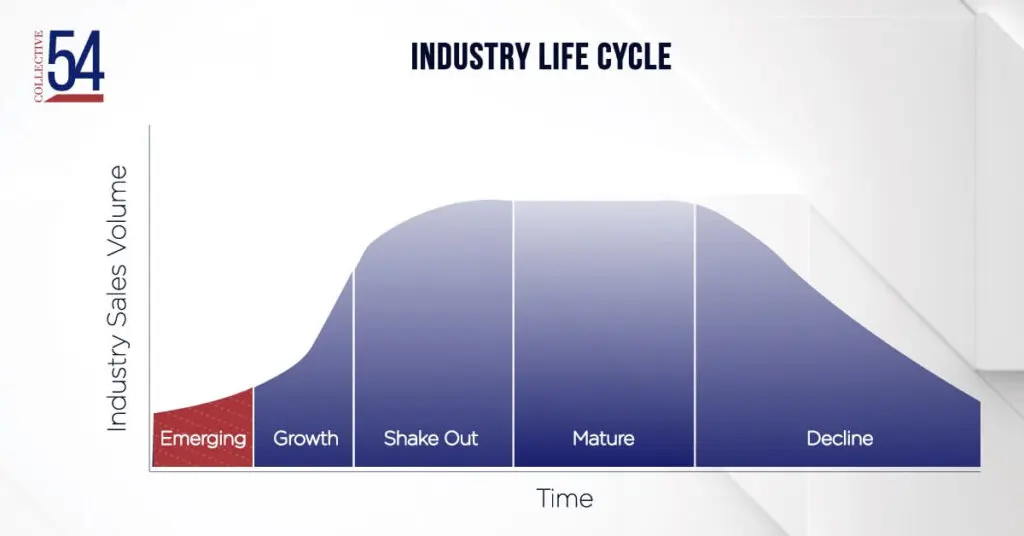How Service Firms Win in Emerging Industries

Emerging industries present unique opportunities for both meteoric rises and swift downfalls for professional service firms. To understand the risks and rewards, it’s helpful to understand that emerging industries are newly formed industries, often created by innovations, that are populated by a new group of well-funded clients with unique needs. This overview of emerging industries, and the strategies necessary to succeed within them, will help professional service firms make the most of this challenging area.
Complex innovations like artificial intelligence, virtual reality, and many others create demand for professional service firms because clients need the expertise to utilize them for their businesses. Professional service firms that position themselves correctly can grow and scale very quickly if they can provide that expertise; however, they must understand the required strategies for emerging industries are different from the strategies in new, declining, or mature industries.
What are the opportunities for professional service firms?
Emerging industries present opportunities for boutique professional service firms because the barriers in mature industries don’t apply to an emerging industry. For example, a boutique service provider in the public accounting space needs to contend with powerful brands such as PwC and Deloitte. Those powerful brands are tough to beat. Emerging industries, conversely, do not yet have powerful brands established. The opportunity exists for a boutique service provider to become a powerful, leading brand in the emerging industry.
The benefits of becoming a credible provider in an emerging industry can be large and long-lasting. For instance, Philip Kotler was early in the digital marketing field when it was an emerging industry in the early 1990s. He wrote 60 books on the subject and became the top professor and consultant in the emerging industry. Large marketing firms, such as WPP and Ogilvey, had the same opportunity but were late to the party. Consequently, a small service provider became the leader and enjoyed approximately 30 years of extraordinary growth.
What Are the Challenges for Professional Service Firms?
There are many challenges present in emerging industries, both for clients and for professional service firms trying to support those clients. For example, clients worry about: innovation risks, sourcing stable partners, getting locked into expensive contracts in a changing field, and the personal cost of looking foolish if it does not work.
Service providers face their own set of challenges when trying to win in an emerging industry. For example, finding talent can be quite challenging in emerging industries as expertise is in limited supply. As a result of the limited talent pool, wages for employees in emerging markets can be very high. These rare employees require a different infrastructure of systems and processes to do their work, and competition can try to poach your talent.
Additionally, founders of boutique service firms often get burned by jumping into an emerging industry quickly only to see the industry become obsolete. Founders need to be careful they are not just chasing fads. Selling services in an emerging industry is hard.
Clients are confused and take a long time to make decisions, and satisfying those clients is equally difficult. Most do not know what quality looks like in an emerging industry, but these problems disappear as the industry matures and clients have options to choose from. Thus, having a concrete strategy for maximizing upside and mitigating risk is crucial to not just surviving but winning in an emerging industry.
Strategies to Maximize Opportunity in Emerging Industries
What are successful strategies for emerging industries? There are some time-tested strategies for competing in an emerging industry:
1. Advocate for the emerging industry in addition to your firm.
As the industry grows, so will your firm.
2. Try to control the channels that prospects and clients will use to educate themselves on the emerging industry.
For instance, consider launching a “trade rag” for the emerging industry and, therefore, become the voice of the industry.
3. Develop an image that establishes your credibility in the emerging industry.
Clients will be looking to reduce risk, and the service provider with the best credentials will win.
4. Get on the learning curve quickly.
The more you do something, the better you get at it and the less it costs. The service provider who moves along the learning curve the fastest will have a distinct advantage over the competitors.
Pitfalls to Avoid as a Founder in an Emerging Industry
While you need a strategy to win in an emerging industry, you must consider that it’s dangerous to be too early in an emerging industry, just as much so as it is to be too late. Being too early will result in building the wrong skills and losing a lot of money; being too late, you’ve missed out on the momentum and will fight an uphill battle against firms that have already established themselves as leaders.
Additionally, the cost of entering an emerging industry is high. Lots and lots of client education and evangelism are required. Unfortunately, these costs are often not converted into proprietary advantages. A boutique could end up educating prospects on their opportunities in emerging industries only to have them select a competitor.
Lastly, many emerging industries are a result of technological innovation, yet the tech changes very quickly. In some cases, the need for a service can disappear overnight when a tech system automates it. For example, websites are cheap templates today, yet they were expensive custom software-development projects just a decade ago.
Emerging industries provide both boundless opportunities and challenges, but only professional service firms that plan out a strategy fitted to an emerging industry will be among those who have an opportunity to become industry leaders.
